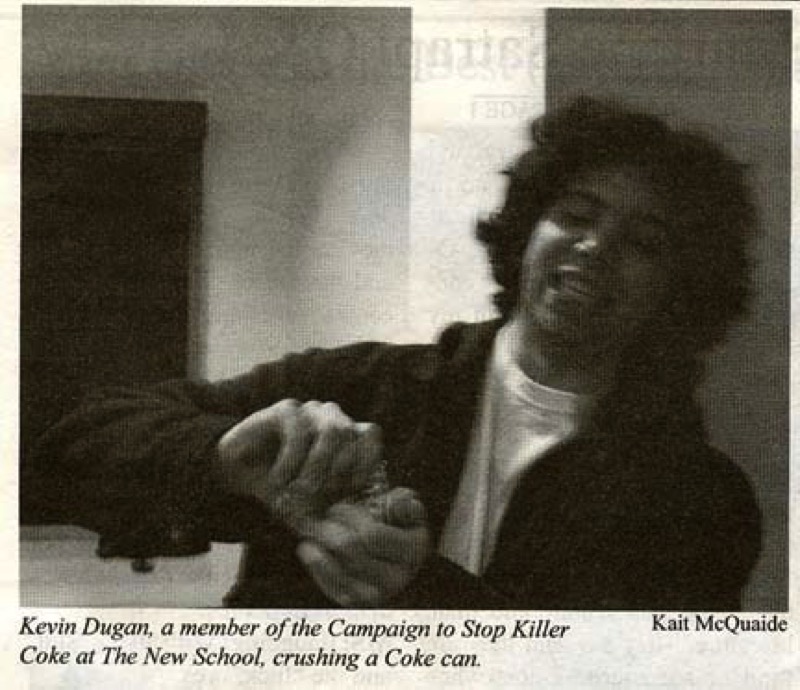Students Push to Ban Coke
By Rob Hartman | Inprint (Eugene Lang College and The New School Community) | Fall 2006
Earlier this semester, New School students almost lost one way to get their daily caffeine buzz. But to the chagrin of many Lang activists, administrators recently decided not to implement a campus-wide ban on all Coca-Cola products.
The anti-Coke push began last Spring, when LSU facilitators Kevin Dugan and Brittany Charlton read reports of human rights violations in Coca-Cola's Columbian bottling factories and heard that Rutgers and NYU had campaigns to ban Coke.

According to Ray Rogers, Director of the Campaign to Stop Killer Coke at The New School, 31 American universities across the country have now imposed the ban. But, The New School isn't participating because the company convinced administrators that they did not participate in illegal activities.
"It's making us look really bad to still have these products on campus that are not representative of our ideals," Charlton said.
Last May, Dugan and Charlton drafted letters calling for The New School administration to ban the sale of Coca-Cola products on campus. They were signed by other members of the Lang Student Union and University Student Senate and sent to the former Director of Business Operations at The New School, Dan Cooke, who oversaw dining service operations on campus for Chartwells, the university's food service provider.
The letters cited a report authored by former New York City Councilman Hiram Monseratte, who in 2004 led a delegation to Coca-Cola's Colombian bottling plants to investigate claims from local workers that Coca-Cola management was suppressing union activity. According to the report, there have been 179 human rights violations against Coca-Cola's Colombian workers, including nine murders by paramilitary groups that were possibly under the knowledge and direction of company managers.
On May 3rd, Charlton, who met with Cooke to press for a product ban, said that the company believed the change could be implemented by the fall, if students sent a firm message.
But in mid-August, Charlton received an email from Cooke, explaining that Coca-Cola had defended their labor practices to him over email and that New School would continue selling Coke products.
"My recommendation to my supervisor is that we allow the students the choice of either Pepsi or Coke," Cooke wrote, "and see if they choose to boycott Coke in the fall."
Dugan and Charlton are continuing their efforts, and hope to begin a petitioning campaign to gain support from student groups this fall.
To raise awareness on campus, Dugan created a group page on the Facebook called "Get Rid of Coca-Cola at New School," which lists various charges against Coca-Cola's business practices and links to information on the issue.
Chartwells contacted Dugan through Facebook and offered to set up a meeting with Dugan, Charlton and representatives from Coca-Cola. On October 16th, Dugan and Chariton met with Martin Schanley, Director of Dining Services for Chartwells at The New School, and discussed arranging a meeting with New School administrators and Coca-Cola representatives. No date has been set for this meeting, said Charlton.
While Dugan and Charlton say students can implement their own Coke ban, it's more important to their cause that the administration mandates an official ban.
"For people not to buy Coke is a drop in the bucket," Dugan said. "For New School to ban it, it would put us with other colleges and high schools who are saying 'this isn't right and we don't want this on our campus.' And, the bigger this gets, the more people will start paying attention to it. It would send the message that we're not going to put up with this."
FAIR USE NOTICE. This document contains copyrighted material whose use has not been specifically authorized by the copyright owner. The Campaign to Stop Killer Coke is making this article available in our efforts to advance the understanding of corporate accountability, human rights, labor rights, social and environmental justice issues. We believe that this constitutes a 'fair use' of the copyrighted material as provided for in section 107 of the U.S. Copyright Law. If you wish to use this copyrighted material for purposes of your own that go beyond 'fair use,' you must obtain permission from the copyright owner.











